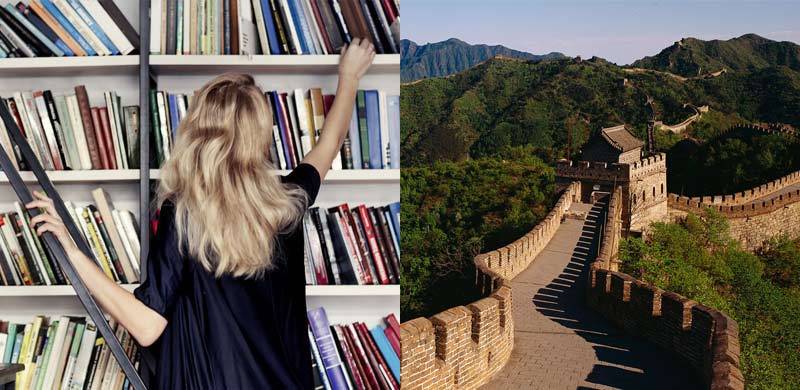
"All roads used to lead to Rome; today they lead to Beijing." This line from Peter Frankopan's New Silk Roads presciently captures the zeitgeist of businesses and policymakers alike. I won't mention why and how China is gaining more prominence at the international stage (we'll do that in the next article) but would definitely share my top five picks that we should read to understand the Middle Kingdom's political, cultural and business environment. Also, its 3,000 years old history and what does the future holds for her!
1) China: A History by John Keay
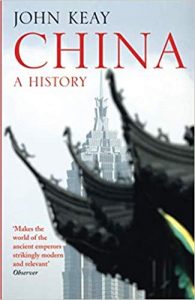 The reader of this book does not only learn about Chinese history in an exceptionally sweeping and profound manner but is also exposed to a beautiful and arresting style of writing that renders the whole experience majestic and grand! Starting from the pre-imperial fabled dynasties of Xia, Shang and Zhou, the writer continues to walk us through eons of political upheaval, dynastic vicissitudes and economic and administrative progress while the characteristic familial values steeped in Confucian thought remains a common theme.
The reader of this book does not only learn about Chinese history in an exceptionally sweeping and profound manner but is also exposed to a beautiful and arresting style of writing that renders the whole experience majestic and grand! Starting from the pre-imperial fabled dynasties of Xia, Shang and Zhou, the writer continues to walk us through eons of political upheaval, dynastic vicissitudes and economic and administrative progress while the characteristic familial values steeped in Confucian thought remains a common theme.
The reader will be surprised to know that even one of the most laudable dynasties, Song, were not alone in the empire that had other "rogue" or mini empires within. Also, that while "Empire remained a constant only dynasties rose or fell" in case of China. This and many more things. It’s a treat for those who want to understand the country in a scholarly manner.
2) When China Rules the World by Martin Jacques
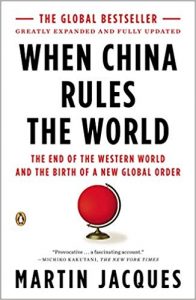 We don't know when that will happen. But what we do know after reading this brilliant analysis of Martin Jacques that it might be very soon. The writer in this book besides mentioning China's history and political conditions also touches upon topics such as its society, cultural values (like the difference between a guilt culture and a shame culture) and cuisines! Even how the dressing of yellow races changed and is now changing the contemporary world.
We don't know when that will happen. But what we do know after reading this brilliant analysis of Martin Jacques that it might be very soon. The writer in this book besides mentioning China's history and political conditions also touches upon topics such as its society, cultural values (like the difference between a guilt culture and a shame culture) and cuisines! Even how the dressing of yellow races changed and is now changing the contemporary world.
He tells how attitudes against races and other 'foreign' cultures play out in the country. He explains the sprawling reach of Chinese infrastructural diplomacy as institutes like EXIM Bank, CDB and AIIB surpass, in some cases, even World Bank and International Monetary Fund in granting aid to countries!
He gives compelling facts and figures that at times show China becoming largest trade partner of countries—a title previously held by the US in many cases. We can see that China, while adapting to the changes, is "writing her own rule book", and that many indicators point in a promising future for China.
3) China's Economy: What Everyone Needs to Know by Arthur Kroeber
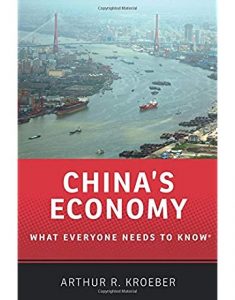 This book answers almost most of the questions that a layman, policymaker and businessman should have in his mind. From "will the bubble burst in China" to "Does China Cheat" (the answer is no) the author covers all.
This book answers almost most of the questions that a layman, policymaker and businessman should have in his mind. From "will the bubble burst in China" to "Does China Cheat" (the answer is no) the author covers all.
The format of the book is very interesting as it divides chapters in different areas such as the Financial System or Enterprise System and then addresses different questions related to that overarching theme.
The writer points toward many problems that China will have to face such as growing population that is increasingly becoming aware and the trade-off that the country's officials may consider whether to give more freedom and loosen control or to tighten it which can threaten the economic progress upon which the China’s Communist Party's future rests!
4) China's Disruptors by Edward Tse
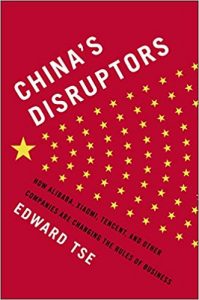 I have done a detailed review about this one as well. Trying not to repeat myself I would say that this book is extremely relevant in today's context when China is thrusting outwards and different countries engage with it for the first time. Its businesses are eyeing new markets and stepping to ever new pedestals of success in their home country.
I have done a detailed review about this one as well. Trying not to repeat myself I would say that this book is extremely relevant in today's context when China is thrusting outwards and different countries engage with it for the first time. Its businesses are eyeing new markets and stepping to ever new pedestals of success in their home country.
When Trump blames China for taking their jobs and then launching a proper trade war, the book seems to make the reader aware of why this is not the right approach to tackle the issue (that is if there is or this is the issue at all!).
5) AI Superpowers: China, Silicon Valley and New World Order by Kai-Fu Lee
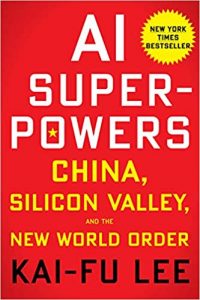 In this book Kai-Fu Lee argues that while big breakthroughs in the field of technology it is not innovation but implementation of it that might make the difference and here China is ahead of the US. The ubiquity and availability of resources in the form of internet makes it easier for everyone interested to work on various innovations. Then there is the salient “hyper-competitiveness” and inexorable dynamism of Chinese economy.
In this book Kai-Fu Lee argues that while big breakthroughs in the field of technology it is not innovation but implementation of it that might make the difference and here China is ahead of the US. The ubiquity and availability of resources in the form of internet makes it easier for everyone interested to work on various innovations. Then there is the salient “hyper-competitiveness” and inexorable dynamism of Chinese economy.
The “scale” of the market and the resulting demand gives China an edge over the rest of the world. And finally with the “official support” by the Chinese government, the entrepreneurs and businessmen might continue to invest heavily in AI and other internet technologies.
All the above books deal with different aspects of China; historical and political, cultural and societal, business and entrepreneurial and finally technological and its future.
Happy Reading!
1) China: A History by John Keay
 The reader of this book does not only learn about Chinese history in an exceptionally sweeping and profound manner but is also exposed to a beautiful and arresting style of writing that renders the whole experience majestic and grand! Starting from the pre-imperial fabled dynasties of Xia, Shang and Zhou, the writer continues to walk us through eons of political upheaval, dynastic vicissitudes and economic and administrative progress while the characteristic familial values steeped in Confucian thought remains a common theme.
The reader of this book does not only learn about Chinese history in an exceptionally sweeping and profound manner but is also exposed to a beautiful and arresting style of writing that renders the whole experience majestic and grand! Starting from the pre-imperial fabled dynasties of Xia, Shang and Zhou, the writer continues to walk us through eons of political upheaval, dynastic vicissitudes and economic and administrative progress while the characteristic familial values steeped in Confucian thought remains a common theme.The reader will be surprised to know that even one of the most laudable dynasties, Song, were not alone in the empire that had other "rogue" or mini empires within. Also, that while "Empire remained a constant only dynasties rose or fell" in case of China. This and many more things. It’s a treat for those who want to understand the country in a scholarly manner.
2) When China Rules the World by Martin Jacques
 We don't know when that will happen. But what we do know after reading this brilliant analysis of Martin Jacques that it might be very soon. The writer in this book besides mentioning China's history and political conditions also touches upon topics such as its society, cultural values (like the difference between a guilt culture and a shame culture) and cuisines! Even how the dressing of yellow races changed and is now changing the contemporary world.
We don't know when that will happen. But what we do know after reading this brilliant analysis of Martin Jacques that it might be very soon. The writer in this book besides mentioning China's history and political conditions also touches upon topics such as its society, cultural values (like the difference between a guilt culture and a shame culture) and cuisines! Even how the dressing of yellow races changed and is now changing the contemporary world.He tells how attitudes against races and other 'foreign' cultures play out in the country. He explains the sprawling reach of Chinese infrastructural diplomacy as institutes like EXIM Bank, CDB and AIIB surpass, in some cases, even World Bank and International Monetary Fund in granting aid to countries!
He gives compelling facts and figures that at times show China becoming largest trade partner of countries—a title previously held by the US in many cases. We can see that China, while adapting to the changes, is "writing her own rule book", and that many indicators point in a promising future for China.
3) China's Economy: What Everyone Needs to Know by Arthur Kroeber
 This book answers almost most of the questions that a layman, policymaker and businessman should have in his mind. From "will the bubble burst in China" to "Does China Cheat" (the answer is no) the author covers all.
This book answers almost most of the questions that a layman, policymaker and businessman should have in his mind. From "will the bubble burst in China" to "Does China Cheat" (the answer is no) the author covers all.The format of the book is very interesting as it divides chapters in different areas such as the Financial System or Enterprise System and then addresses different questions related to that overarching theme.
The writer points toward many problems that China will have to face such as growing population that is increasingly becoming aware and the trade-off that the country's officials may consider whether to give more freedom and loosen control or to tighten it which can threaten the economic progress upon which the China’s Communist Party's future rests!
4) China's Disruptors by Edward Tse
 I have done a detailed review about this one as well. Trying not to repeat myself I would say that this book is extremely relevant in today's context when China is thrusting outwards and different countries engage with it for the first time. Its businesses are eyeing new markets and stepping to ever new pedestals of success in their home country.
I have done a detailed review about this one as well. Trying not to repeat myself I would say that this book is extremely relevant in today's context when China is thrusting outwards and different countries engage with it for the first time. Its businesses are eyeing new markets and stepping to ever new pedestals of success in their home country.When Trump blames China for taking their jobs and then launching a proper trade war, the book seems to make the reader aware of why this is not the right approach to tackle the issue (that is if there is or this is the issue at all!).
5) AI Superpowers: China, Silicon Valley and New World Order by Kai-Fu Lee
 In this book Kai-Fu Lee argues that while big breakthroughs in the field of technology it is not innovation but implementation of it that might make the difference and here China is ahead of the US. The ubiquity and availability of resources in the form of internet makes it easier for everyone interested to work on various innovations. Then there is the salient “hyper-competitiveness” and inexorable dynamism of Chinese economy.
In this book Kai-Fu Lee argues that while big breakthroughs in the field of technology it is not innovation but implementation of it that might make the difference and here China is ahead of the US. The ubiquity and availability of resources in the form of internet makes it easier for everyone interested to work on various innovations. Then there is the salient “hyper-competitiveness” and inexorable dynamism of Chinese economy.The “scale” of the market and the resulting demand gives China an edge over the rest of the world. And finally with the “official support” by the Chinese government, the entrepreneurs and businessmen might continue to invest heavily in AI and other internet technologies.
All the above books deal with different aspects of China; historical and political, cultural and societal, business and entrepreneurial and finally technological and its future.
Happy Reading!
